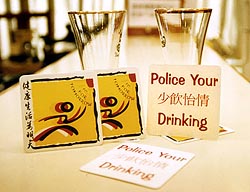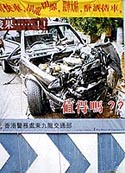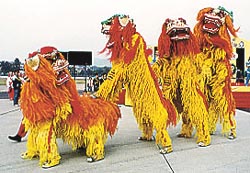



















|
Prepared by the Central Health Education Unit, Department of Health | |
 |
AS alcohol consumption becomes more
acceptable and popular in society, so too do the problems associated with its abuse °– the
major affliction being addiction leading to alcoholism.
Alcoholism is "the chronically excessive consumption of alcohol resulting in physical and psychological dependence, and leading to physical, psychological and health impairment." IF you have the following symptoms, you may be suffering from alcoholism: |
|
°ELack of self-control in terms of the amount and frequency of alcohol consumption.
°EYou think about, or want an alcoholic drink first thing when you get out of bed every day. °EYou are in no mood to do anything if you do not have a beer, a glass of wine, or a shot of hard liquor. °EYou drink even when you are at work. °EWhen you have a meal (be it breakfast, lunch or dinner), you drink more than you eat. °EYou are dead drunk at least once a week. °ESporadic amnesia occurs especially when you are drunk. °EYour hands tremble unconsciously or uncontrollably when you are deprived of alcohol. °EYou have frequent clashes with friends, family and colleagues because of alcohol. °EYou develop a sense of guilt for alcohol consumption. THE negative physiological effects of alcoholism on the central nervous system can be: loss of memory, impairment of logical thinking and judgement, blurred vision, malfunction of sense organs, sluggishness in movement, slurred speech, loss of co-ordination, and hallucinations. Abuse, and excessive consumption of alcohol can lead to heart enlargement, cardiac failure, and escalating blood pressure, as well as such digestive system ailments as esophagitis, gastritis, gastric ulcers, internal bleeding, and malnutrition. The effects of alcoholism on the liver resulting in hepatomegaly and cirrhosis of the liver which lead to liver cancer are well documented °– as are the effects of alcohol on the foetus of women who are pregnant. The mortality rate of unborn children of mothers-to-be who consume alcohol is high, as are the incidences of Foetus Alcohol Syndrome which include symptoms such as poor body development, sluggish growth, abnormal appearance, low birth weight and poor mental ability. PSYCHOLOGICAL effects of alcoholism include: abrupt personality changes, unstable emotions, depression, insomnia, and suicidal tendencies. In addition, an alcohol abuser's social life and work performance is nearly always adversely affected leading to unemployment, financial difficulties, as well as family problems (including episodes of child and spousal abuse), and divorce. In all, alcoholism negatively impacts every aspect of an abuser's life °– physically, mentally and socially. FOR those who are addicted, or who abuse alcohol, giving up is not easy. The first step is to announce your decision to quit alcohol to relatives, friends and colleagues, then to stand firm and be resolute in saying 'No'. Following that, alcoholic drinks should be replaced with non-alcoholic drinks. That accomplished, activities that are mainly for alcohol consumption should then be avoided, and support groups where members can encourage abstention joined. Indeed, to successfully treat alcoholism, a combination of therapy consisting of medication, psychological counselling and recovery support is needed. At the early stage, signs of withdrawal will appear °– nervousness, irritability, insomnia, shaky hands, poor appetite, and an increase in pulse rate. However, these symptoms will diminish as time goes by. Abstaining is infinitely difficult, so if you are determined to quit alcohol abuse and consumption be prepared for a fight - and to carry on no matter what. VENUES FOR QUITTING ALCOHOL Tuen Mun Alcohol Problem Clinic (Hospital Authority). Services include assessment, quitting alcohol, psychological treatment, or referral to other counselling services. Call: 2456-6647. Alcoholics Anonymous (Voluntary Agency). People with successful experience quitting alcohol give advice and assist people who are determined to stop drinking. Call: 2578-9822 (Chinese); 2522-5665 (English). IF you want to know more about health issues, please call 2833-0111, the 24-hour Health Education Hotline. | |

 RC KE John Yuen Ying-lam officiating at the road safety campaign carnival, which aimed to prevent carnage on the roads of the HKSAR as depicted in the poster (left) | A SPECTACULAR Road Safety Carnival, officiated by RC KE, John Yuen Ying-lam, was organised by Traffic KE on the apron of former Kai Tak Airport on Sunday 10 January, with substantial support from Government Property Administrator Lai Kwok-ying, various sponsors - and with much work, time and effort by the Road Safety Team, TKE. |
|
The theme of this year's event was developing a "Correct Driving Attitude" with most of the activities targeting drivers. All invited guests, who wore brightly coloured wind-breakers bearing road safety logos, mixed easily with the estimated 10,000 members of the public who attended the carnival. The programme included performances from popular stars and singers Sit Ka-yin, Mak Cheung-ching, Leung Pui-shan, Choi Tsai-man, Ng Kong and Lee Lung-kei, along with a 100-foot dragon dance, as well as a northern lion dance, a waist-drum dance (performed by the members of the Hong Kong Shumei Church) and a fashion show by kindergarten students who modelled clothing displaying road traffic signs and markings. A remote-controlled model helicopter show with slogans displayed promoting road safety messages, as well as a popular remote-controlled model car demonstration operated by a car club invited from Japan, was a huge hit, as was the stall of safe driving games conducted by the HK School of Motoring Ltd which enabled children to enjoy the fun of "driving".”. A display of Chinese characters for "Safety" made by 170 private cars, along with huge banners raised by four gigantic helium balloons also brought the road safety message home in a spectacular way. | |
|
Although traffic accidents in 1998 dropped in comparison to 1997 from 2,475 to 2,301, traffic accidents caused by drivers still run at a rate of 70 per cent. Through road safety activities such as this campaign, Traffic KE hopes to continue to lower road accidents and casualties, especially those that occur on the region's highways °– a hotbed of accidents due to tailgating, speeding and careless lane changing. In addition to enforcement action, road safety promotion and education remains a long term commitment in KE Region, and Traffic KE continues to gain strong support from the community in promoting its road safety message. |  Spectacular KE Regional road safety campaign carnival |

